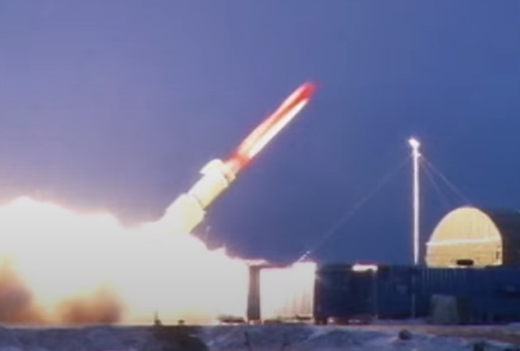Russia says it has tested nuclear-powered cruise missile, Kremlin officials claim
Mangalore Today News Network
Moscow, Oct 25, 2025: Russian President Vladimir Putin on Sunday announced that Moscow has successfully tested the Burevestnik (designated 9M730; NATO reporting name SSC-X-9 Skyfall), a nuclear-powered cruise missile, Kremlin officials said.
In televised remarks, Mr. Putin said the missile demonstrated a very long flight range and the ability to evade current missile-defence systems. The president’s statement included an explicit message to the United States, asserting that the weapon “cannot be stopped, cannot be intercepted, and cannot be escaped,” according to the Kremlin account.

Russian military officials, including Chief of the General Staff Gen. Valery Gerasimov, provided technical details of the exercise. They said the test on October 21 saw the missile travel about 14,000 kilometres and remain airborne for roughly 15 hours. The Russian description emphasizes that the Burevestnik is powered by a small onboard nuclear reactor, which would—if the claims are accurate—allow much longer flight duration than conventional jet or rocket propulsion.
The Kremlin has described the Burevestnik project as one of several new strategic weapons unveiled by Mr. Putin since 2018. At the time of its announcement, Russian officials said the system would have an effectively “unlimited” range because it relies on a nuclear power source rather than conventional fuel.
Western defence analysts and government officials have previously expressed scepticism about some Russian claims regarding novel strategic systems; independent confirmation of complex weapons tests typically requires corroboration from additional sources and technical data. The Russian statements released Sunday identify the system as ground-launched and describe it as carrying a nuclear warhead in addition to its nuclear propulsion.
The announcement is likely to prompt renewed scrutiny from NATO and U.S. defence authorities. Russian claims about new strategic capabilities have in the past led to calls for independent verification and assessments of potential implications for global arms control and regional security.
- Mangaluru: Action taken in Chikkamagaluru stone-pelting case; no discussion on dalit CM, says Parameshwara
- Kundapur: Short circuit guts online service centre; equipment worth lakhs destroyed
- BJP slams Priyank Kharge over remarks on RSS, Dakshina Kannada; seeks apology
- Puttur: Women’s college students protest over dust; principal confronts MLA Ashok Kumar Rai
- Mangaluru: Bomb threat e-mail to District Court turns out to be hoax
- Ramakunja boy’s death: Medical report confirms teen shot father before suicide
- SCDCC Bank to launch UPI, IMPS digital banking services on February 17
- Vitla: Car crashes into electric pole, passengers escape unhurt
- Puttur: Elderly man murdered in Nelyadi; son and two others detained
- Mangaluru: Four booked for poaching Indian black turtles for ritual after grandmother’s death
- KSRTC revises luggage charges from February 16; rates increased by around 15%
- Kundapur: Absconding accused in 11 criminal cases arrested after four years
- Ullal: Fish truck rams school bus on NH-66 at Kapikad, seven students injured
- Drugs worth Rs 21.50 cr seized in Bengaluru, 15 peddlers including three foreign nationals held
- Court awards death penalty to three for gang rape of Israeli tourist, murder of Odisha man in Hampi
- India seizes three Iran-linked, US-sanctioned tankers
- AI Summit in Delhi opens to huge interest, crowding leads to delays, confusion
- Bengaluru bank deputy manager steals Rs 3.5-crore gold from lockers for online gambling
- Seven killed in chemical factory fire in Rajasthan, two trapped inside
- Minister Priyank Kharge accuses RSS of indulging in money laundering
- Five youths killed after car jumps median, crashes into KSRTC bus on Bengaluru–Tumakuru Highway
- T20 World Cup 2026: Ishan, Hardik Star as India Beat Pakistan
- Over 4.79 Lakh Children in Karnataka Severely Stunted: Govt Data
- Indian Student Found Dead in California; Consulate Assures Repatriation Support
- Sikh separatist Pannun murder plot: Nikhil Gupta pleads guilty in U.S. court
- Mangaluru Student Goes Missing; Ullal Police Register Case
- APD Foundation Joins WHO Civil Society Commission
- Daiva’s prediction comes true: Janardhan Reddy walks free from jail
- Skills and Competencies Take Center Stage at MSN Dialogue Series
- Court remands Maoist Lakshmi to six-day police custody
- Sandhya Shenoy honored with Society for Materials Chemistry Medal-2024
- White Cornus Apartment in Mangaluru
- City girl wins first place in state-level spell bee competition
- Alleged ‘Love Jihad’ Case in Mangaluru: Woman left home voluntarily, says police
- Girl fatally struck by reckless two-wheeler near Belman
- New residential complex for the judges inaugurated in Mangaluru
- Absconding accused nabbed after 8 years
- Truck with cylinders turns turtle in Beltangady
- Bhoota Kola artist dies of cardiac arrest
- Development of the country should be our goal: Ganesh Karnik
- CITY INFORMATION
- TRAVEL
- TOURIST INFORMATION
- HEALTH CARE
- MISCELLANEOUS




 Write Comment
Write Comment E-Mail To a Friend
E-Mail To a Friend Facebook
Facebook Twitter
Twitter  Print
Print 


